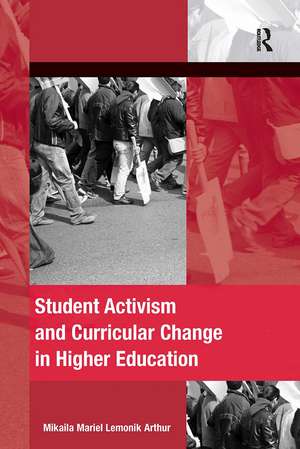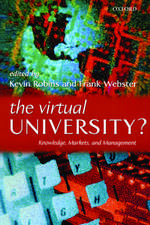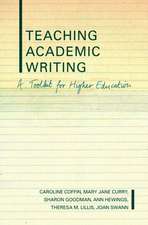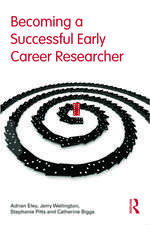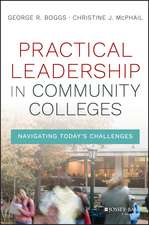Student Activism and Curricular Change in Higher Education
Autor Mikaila Mariel Lemonik Arthuren Limba Engleză Paperback – 14 oct 2024
| Toate formatele și edițiile | Preț | Express |
|---|---|---|
| Paperback (1) | 258.70 lei 6-8 săpt. | |
| Taylor & Francis – 14 oct 2024 | 258.70 lei 6-8 săpt. | |
| Hardback (1) | 1057.89 lei 6-8 săpt. | |
| Taylor & Francis – 28 ian 2011 | 1057.89 lei 6-8 săpt. |
Preț: 258.70 lei
Preț vechi: 310.75 lei
-17% Nou
Puncte Express: 388
Preț estimativ în valută:
49.51€ • 51.75$ • 41.83£
49.51€ • 51.75$ • 41.83£
Carte tipărită la comandă
Livrare economică 06-20 martie
Preluare comenzi: 021 569.72.76
Specificații
ISBN-13: 9781032927374
ISBN-10: 1032927372
Pagini: 212
Dimensiuni: 156 x 234 mm
Greutate: 0.39 kg
Ediția:1
Editura: Taylor & Francis
Colecția Routledge
Locul publicării:Oxford, United Kingdom
ISBN-10: 1032927372
Pagini: 212
Dimensiuni: 156 x 234 mm
Greutate: 0.39 kg
Ediția:1
Editura: Taylor & Francis
Colecția Routledge
Locul publicării:Oxford, United Kingdom
Public țintă
AcademicNotă biografică
Mikaila Mariel Lemonik Arthur, Assistant Professor of Sociology, Rhode Island College, USA
Cuprins
Part I Introduction; Chapter 1 The Promise (and the Threat) of Curricular Change; Chapter 2 Interdisciplinary Studies in Context: The Births of Women’s Studies, Asian American Studies, and Queer Studies; Part II Six Cases; Chapter 3 A Place to Become Women: Abigail Adams College; Chapter 4 Our Work is Never Done: Promenade University; Chapter 5 Reaching for Tomorrow: Technopark University; Chapter 6 Fighting the Good Fight: Jeffrey University; Chapter 7 Fanning the Flames of Knowledge: Sagebrush University; Chapter 8 Understanding Human Experience: The College of Assisi; Part III Analysis; Chapter 9 Moving Curricular Change: The Process and Product of Change Campaigns; Chapter 10 Curricular Change and Collective Action: A Conclusion;
Recenzii
'Student Activism and Curricular Change in Higher Education is an excellent addition to the new and exciting research on movements in the university. Highly recommended for those interested in political sociology and education.' Fabio Rojas, Indiana University, USA 'Student Activism is a fresh and timely contribution to our understanding of how contentious actors destabilize institutionalized practices beyond the state. Creatively merging social movement and organizational theory, this book tells us why certain colleges and universities institute Women’s, Asian American, and Queer Studies programs, while others resist. Essential reading for scholars of contentious politics, higher education, and organizational studies.' Edward T. Walker, University of Michigan, USA 'This is an interesting book and surprisingly so for those of us, who like myself have a limited experience of higher education in the USA. ... Thinking through what changing curricula in higher education says about our identity and values as a community is well worth the effort. Additionally this is done in order to comment on how change occurs in institutions, which by their nature, are intended to reproduce socially valuable knowledge.' Australian Universities Review '... provides a rigorously developed framework that theorises the successes and failures of student and staff movements to implement curricular change in higher education establishments. ... This work is well written and provides a thoughtful and engaging analysis for those who have a keen interest in new knowledge movements and how new academic disciplines emerge in the university. ... offers insights into how effective social movements can enable the twenty-first century university to fulfil its mandate of narrowing social inequalities. ... of relevance to anyone who needs to mobilise against departmental closure.' Irish Journal of Sociology 'Arthur's model represents an innovative effort to import concepts from the social movemen
Descriere
Based on in-depth case-studies of curricular change processes at six colleges and universities across the United States, the book demonstrates that social movements targeting colleges and universities play a major role in curricular change and sets forward a new model for understanding what it takes for social movements targeting organizations to m
